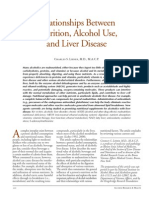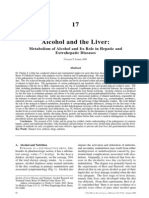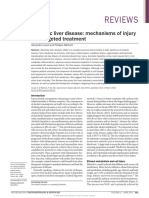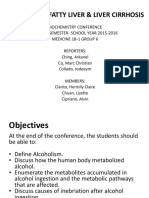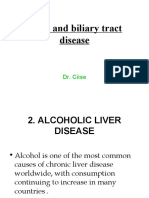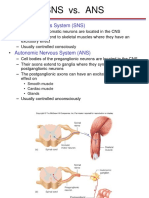0% found this document useful (0 votes)
51 views1 pageAlcohol's Impact on Health Systems
Alcohol consumption can damage multiple organ systems in the body. In the liver and gastrointestinal tract, alcohol can cause fatty liver, hepatitis, cirrhosis, and liver failure, as well as diarrhea, weight loss, and vitamin deficiencies. In the nervous system, alcohol leads to tolerance, dependence, and neurotoxicity. The cardiovascular system is impacted through conditions like cardiomyopathy, arrhythmias, hypertension, and coronary heart disease. Alcohol affects the blood through nutritional deficiencies, inhibition of bone marrow, anemia, and hemolytic syndromes. It can also impact the endocrine system and electrolyte balance, causing issues like gynecomastia, fluid and electrolyte disorders, hypoglycemia, and ketosis.
Uploaded by
dave_1128Copyright
© © All Rights Reserved
We take content rights seriously. If you suspect this is your content, claim it here.
Available Formats
Download as DOCX, PDF, TXT or read online on Scribd
0% found this document useful (0 votes)
51 views1 pageAlcohol's Impact on Health Systems
Alcohol consumption can damage multiple organ systems in the body. In the liver and gastrointestinal tract, alcohol can cause fatty liver, hepatitis, cirrhosis, and liver failure, as well as diarrhea, weight loss, and vitamin deficiencies. In the nervous system, alcohol leads to tolerance, dependence, and neurotoxicity. The cardiovascular system is impacted through conditions like cardiomyopathy, arrhythmias, hypertension, and coronary heart disease. Alcohol affects the blood through nutritional deficiencies, inhibition of bone marrow, anemia, and hemolytic syndromes. It can also impact the endocrine system and electrolyte balance, causing issues like gynecomastia, fluid and electrolyte disorders, hypoglycemia, and ketosis.
Uploaded by
dave_1128Copyright
© © All Rights Reserved
We take content rights seriously. If you suspect this is your content, claim it here.
Available Formats
Download as DOCX, PDF, TXT or read online on Scribd
/ 1





















